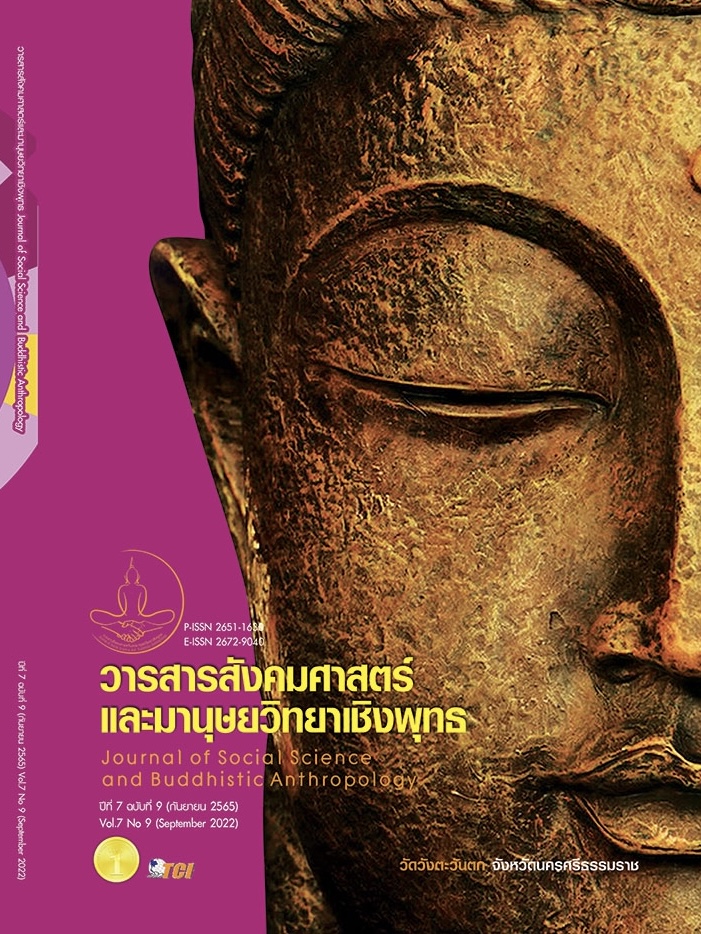COMMUNITY INNOVATION FOR HEALTH CARE OF THE ELDERLY BY USING FAMILIES AND TEMPLES AS A BASE IN CHIANG MAI PROVINCE
Keywords:
Community Innovation, Elderly Health Care, Families and Temples as a BaseAbstract
The objectives of this research article were to 1) study the context of community-based innovation for health care for the elderly by using family and temples as the base in Chiang Mai; 2) study community-based innovations. It is a mixed research method. Quantitatively, the population and the sample group were the Senior School Working Group. and the leaders of the Elderly School, totaling 187 figures/person, and the qualitative research. which are Administrators of School for the elderly president of Choengdoi Subdistrict Administrative organization senior school working group and the leaders of the elderly school Chiang Mai., 12 monk/person by using an interview form and a questionnaire to analyze descriptive statistical data. The results showed that 1) The majority of the elderly were male, aged over 60 years, having primary and lower secondary education. Occupational employment and farming Context and community-oriented innovation Overall, the average was 4.41 with a high level of satisfaction. and has a standard deviation of 0. 05 When considering the proportion of innovation, it can be concluded that Elderly people are satisfied with health innovations. First came first, followed by innovation in the promotion of savings. Community Welfare Innovation to make money Innovation of local wisdom Environment and housing innovations, respectively. 2) Community-oriented innovations, it was found that schools for the elderly had families and temples as bases to focus primarily on physical and mental health care of the elderly. There are network partners to help and support. Encourage the elderly to seek knowledge, understanding, decision-making, practice, to until they can be self-reliant to their full potential. and community-based innovations resulted in the majority of developed elderly people having income, occupation, savings, and self-care. Make the elderly have good health leading to new innovations. By opening as a college of three ages or "Putthiwattana Pracha Suksan College".
References
คณะทำงานคาดประมาณประชากรของประเทศไทย พ.ศ. 2553 - 2583. (2555). ผลการคาดประมาณประชากรของประเทศไทย พ.ศ. 2553 - 2583. กรุงเทพมหานคร: สำนักงานคณะกรรมการ พัฒนาการเศรษฐกิจและสังคมแห่งชาติ.
เฉลิม ศาลแปง. (20 กุมภาพันธ์ 2564). นวัตกรรมเชิงชุมชนสำหรับดูแลสุขภาวะผู้สูงอายุโดยใช้ครอบครัวและวัดเป็นฐานในจังหวัดเชียงใหม่. (สายทิพย์ เป็นคุณ, ผู้สัมภาษณ์)
ณัทธร สุขสีทอง. (2560). ภูมิปัญญาพื้นฐานบ้านล้านนากับการเสริมสร้างสุขภาพผู้สูงอายุองค์การบริหารส่วนตำบลสะลวง อำเภอแม่ริม จังหวัดเชียงใหม่. วารสารมหาวิทยาลัยคริสเตียน, 23(2), 164-173.
เทียนแก้ว เลี่ยมสุวรรณ. (2563). นวัตกรรมนโยบายสวัสดิการเพื่อผู้สูงอายุขององค์กรปกครองส่วนท้องถิ่นในภาคตะวันออก. วารสารด้านการบริหารรัฐกิจและการเมือง, 9(1), 172-176.
นคร จันต๊ะวงษ์ และคณะ. (2564). การพัฒนานวัตกรรมการพึ่งพาตนเองด้านสุขภาพด้วยสมุนไพรใกล้มือสำหรับผู้สูงอายุ. วารสาร มจร สังคมศาสตร์ปริทรรศน์, 1(1), 252-254.
พระราเชนทร์ วิสารโท. (2560). บูรณาการพุทธธรรมกับระบบการดูแลสุขภาพระยะยาวสำหรับผู้สูงอายุของอำเภอศรีวิไล จังหวัดบึงกาฬ. วารสารมหาจุฬาวิชาการ, 4(2), 87-89.
มูลนิธิสถาบันวิจัยและพัฒนาผู้สูงอายุไทย (มส.ผส.) ภาคีเครือข่ายสำนักงานกองทุนสนับสนุนการสร้างเสริมสุขภาพ (สสส). (2565). เวทีเสวนาออนไลน์ “อนาคตสังคมผู้สูงอายุไทย ก้าวต่อไปอย่างไรบนความท้าทาย” มีเป้าหมายผลักดันนโยบายเพื่อสุขภาวะที่ดีของผู้สูงอายุทั่วประเทศ. เรียกใช้เมื่อ 8 กรกฎาคม 2565 จาก https://www.tnnthailand.com /news/health/103902/
ระพีพรรณ คำหอม และคณะ. (2560). การพัฒนานวัตกรรมเพื่อผู้สูงอายุกับทางเลือกการลดความเหลื่อมล้ำของผู้สูงอายุไทยสนับสนุนทุนโดยสำนักงานกองทุนสนับสนุนการวิจัย. กรุงเทพมหานคร: สำนักงานกองทุนสนับสนุนการวิจัย.
วิสาขา ภู่จินดา และคณะ. (2564). ทิศทางองค์ความรู้ด้านการจัดการสิ่งแวดล้อมสำหรับผู้สูงอายุในสถานการณ์พลิกพลัน. วารสารปกครองท้องถิ่น, 14(3), 314-315.
สำนักงานคณะกรรมการพัฒนาการเศรษฐกิจและสังคมแห่งชาติ. (2562). ยุทธศาสตร์ชาติ พ.ศ. 2561 - 2580 สำนักงานคณะกรรมการพัฒนาการเศรษฐกิจและสังคมแห่งชาติ. กรุงเทพมหานคร: สำนักงานคณะกรรมการพัฒนาการเศรษฐกิจและสังคมแห่งชาติ.
สำนักงานสาธารณสุขจังหวัดเชียงใหม่. (2562). บทวิเคราะห์สถานการณ์ผู้สูงอายุ. เรียกใช้เมื่อ 15 สิงหาคม 2563 จาก https://www.chiangmaihealth.go.th/cmpho_web /document/201007160205184040.pdf
สำนักสถิติจังหวัดเชียงใหม่. (2562). บทวิเคราะห์สถานการณ์ผสู้งอาย. เรียกใช้เมื่อ 1 กรกฎาคม 2565 จาก https://www.chiangmaihealth.go.th/cmpho_web/document /201004040
อุทัยวรรณ พงษ์บริบูรณ์. (2563). สถานการณ์ผู้สูงอายุประเทศไทย: ปัญหาและความต้องการด้านสุขภาพ. วารสารวิชาการมหาวิทยาลัยอีสเทิร์นเอเชียฉบับสังคมศาสตร์และมนุษยศาสตร์, 10(2), 54-55.
Likert, R. (1967). “The Method of Constructing and Attitude Scale”. In Reading in Fishbeic, M (Ed.), Attitude Theory and Measurement (pp. 90-95). New York: Wiley & Son.
Downloads
Published
How to Cite
Issue
Section
License

This work is licensed under a Creative Commons Attribution-NonCommercial-NoDerivatives 4.0 International License.









